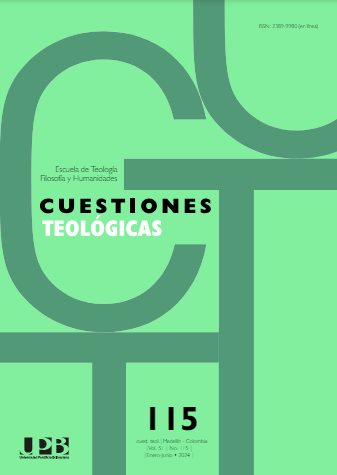In the school of the Psalms: an educational-mystagogical proposal in St. Gregory of Nyssa’s “On the titles of the Psalms”
Main Article Content
Abstract
In the treatise “On the Titles of the Psalms” Gregory of Nyssa first considers some general themes relevant to the Christian life, and then comments at length on the titles of various psalms. In the present article, starting from the observation of some terms related to central aspects that characterize the Gregorian reading - sequentiality, gradualness, tension towards the infinite and openness to mystery -, an attempt is made to specify the fundamental objective at which the exegesis of this work aims. It can be seen that, according to Gregory’s interpretation, there would be a sort of “sequence” in the very disposition of the Psalter, which would become, in this way, an invitation to the receiver to undertake an ascending path that, starting from the initial turning away from evil and the cultivation of virtue (Psalm 1), is oriented to reach the ultimate end -thelos- of all human existence: eternal beatitude through participation in the choirs of divine praise. Gregory ultimately seeks to make more accessible the understanding of “the enigmatic teaching of the mysteries and the ineffable theology that is hidden in doctrines that are difficult to attain” (Part I, ch. 3). Finally, and by way of projection towards the present day, it is pointed out that the Gregorian reading of the Psalms - positive and hopeful - can stimulate one’s own spiritual experience in the midst of contemporary tensions and difficulties: in its “school” the recipients are introduced, pedagogically, into the realm of the divine mystery of the salvation of human beings.
References
Cornavaca, R. (1996). La mutabilidad del hombre y la protréptica divina. Teología. Revista de la Facultad de Teología de la Pontificia Universidad Católica Argentina, (67), 27-34.
Cornavaca, R. (2004). La intencion protreptica en las “Homilias sobre el Cantar de los Cantares” de S. Gregorio de Nisa. En D. Lasa et al. (Eds.). Estudios Patristicos (pp. 111-138). Villa Maria: Ediciones del IAPCH, Universidad Nacional de Villa Maria.
GNO V. (1986). Gregorii Nysseni Opera (Tomo V, J. Mc Donough y P. Alexander, Eds.). Leiden: Brill.
Heine, R. (1995). Gregory of Nyssa’s Treatise on the Inscriptions of the Psams. Oxford: Clarendon Press.
Jaeger, W. (1965). Cristianismo primitivo y paideia griega. Mexico, Buenos Aires: Fondo de Cultura Economica.
Leemans, J. (2016). Bible, Rhetoric and Theology: Some Examples of Mystagogical Strategies in St. Gregory of Nyssa’s Sermons. In P. van Geest (Ed.). Seeing Through the Eyes of Faith (pp. 105-125). Leuven: Peeters.
Mateo-Seco, L. F. y Maspero, G. (Eds.). (2006). Diccionario de S. Gregorio de Nisa. Burgos: Monte Carmelo.
Reynard, J. (2002). Gregoire de Nysse. Sur les titres des Psaumes. Paris: Sources Chretiennes, Les Editions du Cerf.
Riedweg, C. (1987). Mysterienterminologie bei Platon, Philon und Klemens von Alexandrien. Berlin, New York: De Gruyter.
Traverso, A. (1994). Gregorio di Nissa. Sui titoli dei salmi. Roma: Citta Nuova Editrice.






